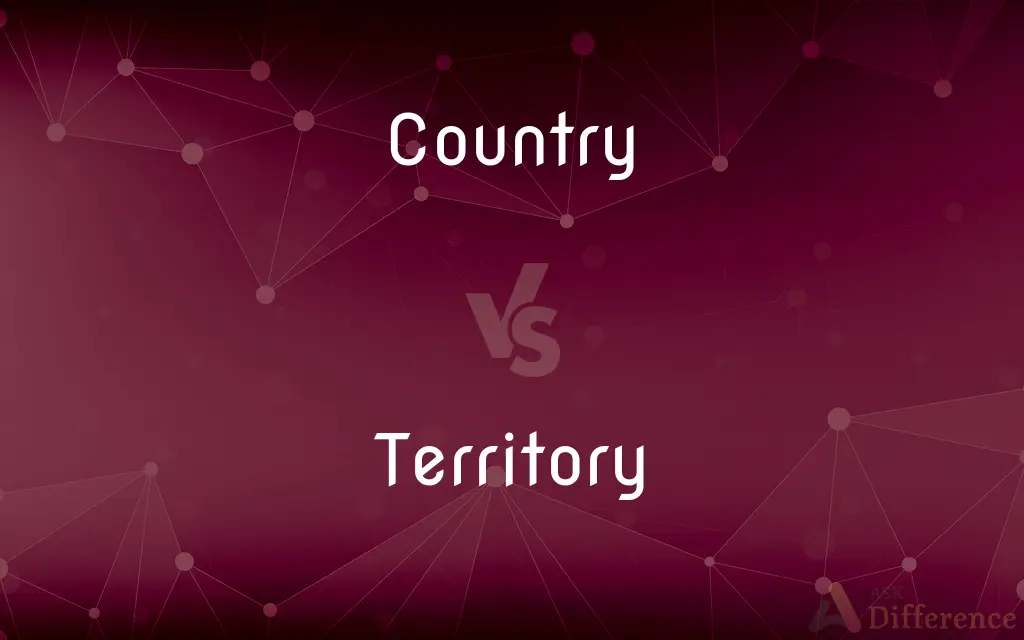Country vs. Territory — What's the Difference?
By Tayyaba Rehman & Maham Liaqat — Updated on March 21, 2024
A country is a sovereign state with its own government and borders, while a territory is a region that may not have full sovereignty and is often governed by another country.

Difference Between Country and Territory
Table of Contents
ADVERTISEMENT
Key Differences
A country, in the context of international law and governance, refers to a sovereign entity with a defined territory, a permanent population, a government, and the capacity to enter into relations with other sovereign states. It is recognized for its political independence and control over its internal and external affairs. On the other hand, a territory is a geographical area that is under the jurisdiction of a country but may not possess full sovereignty or independence. Territories can be governed in various ways, including direct administration by another country, self-governance under international supervision, or as autonomous regions with varying degrees of independence.
Countries have defined boundaries recognized by other countries and international organizations. They have the authority to enact and enforce laws within their borders, issue currency, and set foreign policy. Territories, however, may not have all these powers, as their governance and extent of legislative autonomy are often determined by the controlling country or through international agreements. This distinction affects their ability to engage independently in diplomatic or trade relations.
In terms of international recognition, countries are members of international bodies like the United Nations and have full diplomatic rights and responsibilities. Territories, while they may participate in international organizations, typically do so under the auspices of their controlling country and do not have the same level of diplomatic recognition or ability to participate as independent entities.
The path to becoming a country from a territory involves a complex process of gaining sovereignty and international recognition. This process can occur through independence movements, decolonization initiatives, or the dissolution and reformation of states. In contrast, the status of a territory can remain static for long periods or change depending on administrative decisions, changes in governance, or international treaties.
While countries have a clear status in international law, the status of territories can vary widely, from regions seeking independence to those content under the governance of another country. This variability affects the residents' nationality, citizenship rights, and legal systems, as territories might have different legal and administrative frameworks from the controlling country.
ADVERTISEMENT
Comparison Chart
Definition
A sovereign state with defined borders and a government.
A region under the jurisdiction of another country, possibly with limited autonomy.
Sovereignty
Has full sovereignty and control over its internal and external affairs.
May lack full sovereignty; governed according to the laws and policies of another country or international agreements.
International Recognition
Recognized as a member of international bodies like the UN.
May not have independent recognition; participates in international forums under the controlling country.
Governance
Enjoys full autonomy in governance, law-making, and enforcement.
Governance and autonomy vary; could be directly administered or have some degree of self-governance.
Diplomatic Relations
Can engage in diplomatic relations and sign treaties independently.
Lacks authority for independent diplomatic relations; relies on the controlling country for international dealings.
Compare with Definitions
Country
Has a defined territory and government.
Japan is an island country with a constitutional monarchy.
Territory
Not fully sovereign.
The Falkland Islands are a British Overseas Territory.
Country
A sovereign state recognized internationally.
France is known for its rich cultural heritage.
Territory
A region governed by another country.
Puerto Rico is a territory of the United States.
Country
Engages in foreign policy independently.
Canada has diplomatic relations with over 190 countries worldwide.
Territory
May have limited self-governance.
Greenland, an autonomous territory of Denmark, has its own government.
Country
Issues its own currency.
The United Kingdom uses the British pound as its currency.
Territory
May participate in international organizations under another country.
New Caledonia participates in some international forums as part of France.
Country
Member of international organizations.
Brazil participates in the United Nations as an independent country.
Territory
Can be a region seeking independence.
Tibet is considered by many as a territory seeking independence from China.
Country
A country is a distinct territorial body or political entity (i.e. a nation).
Territory
A territory is an administrative division, usually an area that is under the jurisdiction of a sovereign state. In most countries, a territory is an organized division of an area that is controlled by a country but is not formally developed into, or incorporated into, a political unit of the country that is of equal status to other political units that may often be referred to by words such as "provinces" or "regions" or "states".
Country
A nation with its own government, occupying a particular territory
The country's increasingly precarious economic position
Spain, Italy, and other European countries
Territory
An area of land; a region.
Country
Districts and small settlements outside large urban areas or the capital
A country lane
The airfield is right out in the country
Territory
The land and waters under the jurisdiction of a government.
Country
An area or region with regard to its physical features
A tract of wild country
Territory
A political subdivision of a country.
Country
Short for country music
Territory
A geographic region, such as a colonial possession, that is dependent on an external government
The territories of the Holy Roman Empire.
Country
A nation or state.
Territory
A subdivision of the United States that is not a state and is administered by an appointed or elected governor and elected legislature.
Country
The territory of a nation or state; land.
Territory
A similarly organized political subdivision of Canada or Australia.
Country
The people of a nation or state; populace
The whole country will profit from the new economic reforms.
Territory
An area for which a person is responsible as a representative or agent
A salesperson's territory.
Country
The land of a person's birth or citizenship
Foreign travel is restricted in his country.
Territory
(Sports)The area of a field defended by a specified team
Punted the ball deep into the opponent's territory.
Country
A region, territory, or large tract of land distinguishable by features of topography, biology, or culture
Hill country.
Bible country.
Territory
(Biology)An area occupied by a single animal, mating pair, or group and often vigorously defended against intruders, especially those of the same species.
Country
An area or expanse outside cities and towns; a rural area
A vacation in the country.
Territory
A sphere of action or interest; a province.
Country
The people of a district who are eligible for jury service.
Territory
A large extent or tract of land; for example a region, country or district.
Country
A jury.
Territory
(Canada) One of three of Canada's federated entities, located in the country's Arctic, with fewer powers than a province and created by an act of Parliament rather than by the Constitution: Yukon, Northwest Territories, and Nunavut.
Country
(Informal) Country music.
Territory
(Australia) One of three of Australia's federated entities, located in the country's north and southeast, with fewer powers than a state and created by an act of Parliament rather than by the Constitution: Northern Territory, Australian Capital Territory and Jervis Bay Territory.
Country
Of, relating to, or typical of the country
A country road.
Country cooking.
Territory
A geographic area under control of a single governing entity such as state or municipality; an area whose borders are determined by the scope of political power rather than solely by natural features such as rivers and ridges.
Country
Of or relating to country music.
Territory
(ecology) An area that an animal of a particular species consistently defends against its conspecifics.
Country
(chiefly British) An area of land; a district, region.
Territory
The part of the playing field or board over which a player or team has control.
Country
A set region of land having particular human occupation or agreed limits, especially inhabited by members of the same race, speakers of the same language etc., or associated with a given person, occupation, species etc.
Territory
A geographic area that a person or organization is responsible for in the course of work.
Country
The territory of a nation, especially an independent nation state or formerly independent nation; a political entity asserting ultimate authority over a geographical area; a sovereign state.
Territory
A location or logical space which someone owns or controls.
Country
A rural area, as opposed to a town or city; the countryside.
Territory
A market segment or scope of professional practice over which an organization or type of practitioner has exclusive rights.
Country
Ellipsis of country music
A country song
A country singer
A country festival
Territory
An area of subject matter, knowledge, or experience.
Country
(mining) The rock through which a vein runs.
Territory
A large extent or tract of land; a region; a country; a district.
He looked, and saw wide territory spreadBefore him - towns, and rural works between.
Country
From or in the countryside or connected with it.
Territory
The extent of land belonging to, or under the dominion of, a prince, state, or other form of government; often, a tract of land lying at a distance from the parent country or from the seat of government; as, the territory of a State; the territories of the East India Company.
Country
Of or connected to country music.
Territory
In the United States, a portion of the country not included within the limits of any State, and not yet admitted as a State into the Union, but organized with a separate legislature, under a Territorial governor and other officers appointed by the President and Senate of the United States. In Canada, a similarly organized portion of the country not yet formed into a Province.
Country
Originating in India rather than being imported from Europe or elsewhere.
Territory
A region marked off for administrative or other purposes
Country
A tract of land; a region; the territory of an independent nation; (as distinguished from any other region, and with a personal pronoun) the region of one's birth, permanent residence, or citizenship.
Return unto thy country, and to thy kindred.
I might have learned this by my last exile,that change of countries cannot change my state.
Many a famous realmAnd country, whereof here needs no account
Territory
An area of knowledge or interest;
His questions covered a lot of territory
Country
Rural regions, as opposed to a city or town.
As they walked, on their way into the country.
God made the covatry, and man made the town.
Only very great men were in the habit of dividing the year between town and country.
Territory
The geographical area under the jurisdiction of a sovereign state;
American troops were stationed on Japanese soil
Country
The inhabitants or people of a state or a region; the populace; the public. Hence: (a) One's constituents. (b) The whole body of the electors of state; as, to dissolve Parliament and appeal to the country.
All the country in a general voiceCried hate upon him.
Country
A jury, as representing the citizens of a country.
Country
The rock through which a vein runs.
Country
Pertaining to the regions remote from a city; rural; rustic; as, a country life; a country town; the country party, as opposed to city.
Country
Destitute of refinement; rude; unpolished; rustic; not urbane; as, country manners.
Country
Pertaining, or peculiar, to one's own country.
She, bowing herself towards him, laughing the cruel tyrant to scorn, spake in her country language.
Country
The territory occupied by a nation;
He returned to the land of his birth
He visited several European countries
Country
A politically organized body of people under a single government;
The state has elected a new president
African nations
Students who had come to the nation's capitol
The country's largest manufacturer
An industrialized land
Country
The people who live in a nation or country;
A statement that sums up the nation's mood
The news was announced to the nation
The whole country worshipped him
Country
An area outside of cities and towns;
His poetry celebrated the slower pace of life in the country
Country
A particular geographical region of indefinite boundary (usually serving some special purpose or distinguished by its people or culture or geography);
It was a mountainous area
Bible country
Common Curiosities
Can a territory have its own government?
Yes, some territories have their own government and legislative powers, although these are often limited by the governing country or international agreements.
What makes a country different from a territory?
A country is a sovereign state with complete control over its affairs, while a territory is a region without full sovereignty, often governed by another country.
Can territories become countries?
Yes, territories can become countries through processes like decolonization, gaining sovereignty, and international recognition.
Why do countries control territories?
Reasons include historical claims, strategic importance, economic interests, or the outcome of treaties and international agreements.
Do territories have their own flags and symbols?
Some territories have their own flags and symbols, especially those with some degree of self-governance.
Is a territory the same as a colony?
While similar, the term "colony" historically refers to regions under foreign control primarily for exploitation, whereas "territory" is a broader term that can include regions with varying degrees of autonomy and self-governance.
What is self-governance in a territory?
Self-governance allows a territory some level of autonomy in managing its internal affairs, though it may not have full sovereignty.
How does a territory differ from an autonomous region?
An autonomous region usually has more self-governance and legislative powers within a sovereign country, while a territory might not have these levels of autonomy.
How do economic activities differ between countries and territories?
While both can engage in economic activities, countries have more autonomy in setting economic policies and engaging in international trade.
Can a territory be part of international treaties?
Territories can be subject to international treaties, but these are usually signed and ratified by the controlling country.
Are territories always smaller than countries?
Not necessarily; size is not a determining factor of whether a region is considered a country or a territory.
What rights do people living in a territory have?
The rights of people in a territory depend on its governance structure, laws, and the degree of autonomy granted by the controlling country.
How is a country recognized internationally?
International recognition involves diplomatic acknowledgment by other sovereign states and membership in international organizations.
What impact does being a territory have on cultural identity?
Being a territory can influence cultural identity through the blending of indigenous cultures with those of the controlling country, leading to unique cultural expressions.
What is the role of the UN in territory disputes?
The UN can mediate disputes, monitor situations, and provide platforms for negotiation, but its power is limited by the sovereignty of its member states.
Share Your Discovery

Previous Comparison
Webber vs. Weber
Next Comparison
Gangplank vs. GangwayAuthor Spotlight
Written by
Tayyaba RehmanTayyaba Rehman is a distinguished writer, currently serving as a primary contributor to askdifference.com. As a researcher in semantics and etymology, Tayyaba's passion for the complexity of languages and their distinctions has found a perfect home on the platform. Tayyaba delves into the intricacies of language, distinguishing between commonly confused words and phrases, thereby providing clarity for readers worldwide.
Co-written by
Maham Liaqat














































